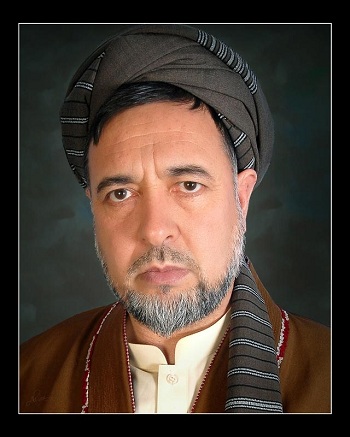 |
|
Ustad Mohammad Mohaqiq is an Afghan Member of Parliament, the leader of Hezb-e-Wahdat Islami Mardom-e-Afghanistan, and a member of the Jabh-e Melli (Afghan National Front) political opposition party formed in 2011. |
Prominent Afghan politician and ethnic Hazara leader Ustad Mohammad Mohaqiq escaped what Afghan security officials are claiming was an assassination attempt during Mohaqiq’s arrival in the western province of Herat on March 7.
Details were provided by TOLONews:
Mohaqiq was due to fly into Herat airport Thursday morning and meet National Front members at the stadium in Herat city.
At around 10:30, an improvised explosive device (IED) hidden in a motorcycle exploded near the stadium, injuring three civilians, according to provincial police chief Rahmatullah Safi.
Moments later, a second blast happened on the road to Herat airport in the area of Sar Jangal. The distance between the two blasts was about 10 kilometres.According to Safi, the second explosion – which took place when a group of security forces were passing by – caused no harm.
Both bombs happened around the time Mohaqiq was due to be in the area, however, his plane landed only after the explosions occurred
This marks the third attempt against Mohaqiq’s life since June 2012. On June 7, unknown gunmen launched a fierce ambush against the Hezb-e Wahdat office in Afghanistan’s central Bamyan province. Mohaqiq was in the office at the time, but escaped uninjured, according to Pajhwok Afghan News and Wahdat News.
Within 24 hours of the June 7 attack, Mohaqiq’s convoy was ambushed as it traveled from Bamyan to Kabul; at least one of Mohaqiq’s drivers was injured. In late June, an unknown assailant broke into the Wahdat News Agency in Kabul, which is owned by Mohaqiq, and viciously assaulted Wahdat News Agency operation manager Mohammad Hussain Hakimi.
So who is to blame for the campaign against Mohaqiq? Naturally, the host of anti-government groups such as the Taliban, the Haqqani Network, and political rivals of Mohaqiq’s Hezb-e-Wahdat party such as Hezb-e Islami come to mind. Mohaqiq himself suggests something entirely different, however.
Wahdat News reported after the June incidents:
Mohaqiq accused the [Afghan] government for planning the attack on his life, saying it feared the plans of the National Front.
“The government fears the National Front’s plans so it wants to launch a mental war against adherents of to the National Front,” Mohaqiq said…”We have [a] right to speak on the shortcomings and defects of the government…We have our own programme but we should not be answered with accusations and armed attacks.”
Mohaqiq has not yet directly accused the Afghan government of facilitating the recent double roadside bomb attack along his convoy’s expected travel route in Herat. But clearly there was a serious security leak, which allowed Mohqiq’s enemies to plan, procure, and implement two explosive devices along the route Mohaqiq would be using to attend a high-profile Afghan National Front political gathering at the Herat City stadium.
Continued ethnic, sectarian, and political attacks, such as those targeting Afghanistan’s ethnic minority leaders like Mohaqiq, offer an alarming glimpse at the complex and volatile political landscape Afghanistan faces and its implications for the upcoming security transition and withdrawal of international forces, and for next year’s presidential elections.
Are you a dedicated reader of FDD's Long War Journal? Has our research benefitted you or your team over the years? Support our independent reporting and analysis today by considering a one-time or monthly donation. Thanks for reading! You can make a tax-deductible donation here.








2 Comments
“..offer an alarming glimpse,” I fail to ‘see’ what’s so ‘alarming’ about a ‘cultural practice’ that’s been a regular part of the human experience in this ‘part’ of the world for at least a couple of millenium.’
Sounds like Mr Mohaqiq should invest in some Platinum-Level Life Insurance, and probably also a titanium corset …